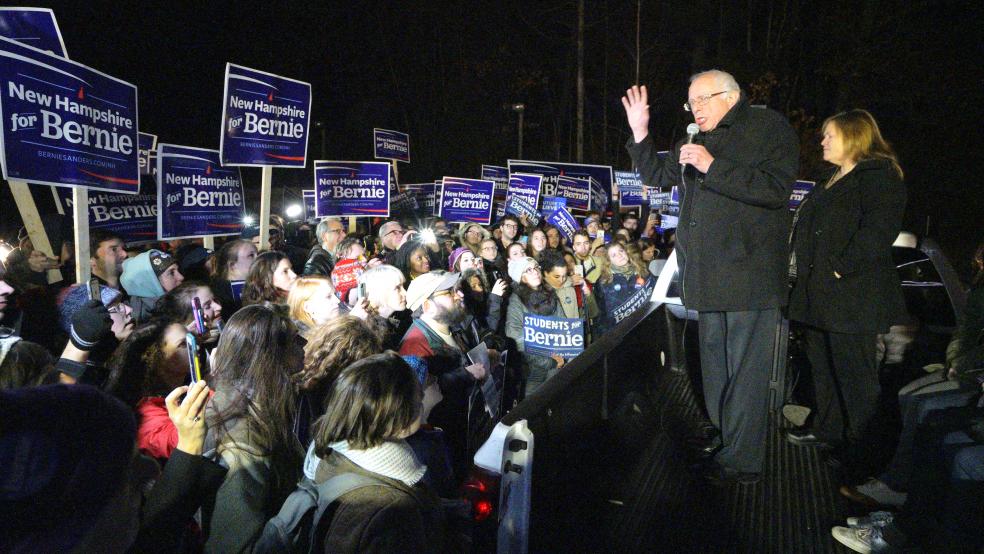Former Secretary of State Hillary Clinton eked out a victory at Monday night's Democratic Iowa caucuses over Sen. Bernie Sanders of Vermont, narrowly averting what might have been a political catastrophe, but assuring a long-term slog to the nomination.
By an improbable margin of roughly 50 percent to about 49.5 percent of the delegate votes, Clinton held off a Sanders challenge that threatened to upend what at one time appeared to be a certain march to her party's nomination and vindication for her startling loss to President Obama in the 2008 Democratic campaign.
The results were the closest in the history of the Iowa caucuses.
Related: Donald Trump Rolls Snake Eyes in Iowa
NBC News declared Clinton the apparent winner at 2:37 a.m. ET on Tuesday, with the results from one precinct still outstanding. The extraordinarily close results – which Sanders dubbed a “virtual tie” -- may change before it's all over. But for now they raise numerous what-ifs for both contenders.
For Clinton, the question is whether she could have elevated her game more and excited her more centrist political base in the final weeks of the campaign to match the excitement generated by Sanders among liberals and college students. Is her assertion that she is more experienced and better prepared to lead the country enough to counter Sanders’ anti-establishment and anti-Wall Street message?
Also, did the Clinton campaign make a serious mistake by not challenging Sanders sooner on the practicality of his huge spending proposals and trillion dollar tax-hike proposals? And finally, was she hurt by the last minute reports last Friday that the State Department had identified 22 of her emails on a private server during her four years as the nation’s top diplomat containing "top secret" information?
As for Sanders, he must be asking himself whether going more negative over Clinton's email controversy would have made the difference. And for all his success in stoking the enthusiasm of college students and other young Americans, did he fail to make a convincing case to other Democrats that he has the experience and know how to be the next commander in chief?
It was easier for Sanders to declare victory, even if he fell just short of a majority because of the optics of the election.
Related: Here’s the Big Advantage Ted Cruz Has as Voting Begins
"What Iowa has done tonight is begin a political revolution,” the 74-year-old White House contender told a raucous crowd of supporters.
Sanders – who once was viewed as little more than a fringe candidate -- said the people of Iowa “have sent a very profound message” that it is “just too late for establishment politics and establishment economics” before going into this stump speech, calling for universal healthcare and free tuition at public colleges and universities.
The self-avowed democratic socialist who is not a member of the Democratic Party also noted that he has “been criticized during this campaign for many, many things.” Perhaps with that in mind, he proposed paying for some of his plans by imposing a tax on Wall Street speculation.
While Clinton addressed her supporters first, and confessed to “breathing a big sigh of relief,” she said, “I am a progressive who knows how to get things done.” Flanked by her husband, former President Bill Clinton, and their daughter, Chelsea, a jubilant Clinton continued, “And I am excited about really getting into the debate with Senator Sanders about the best way forward to fight for us and America.”
Related: Why Trump and Sanders Share a Mandate for Universal Health Care
The former First Lady used her brief remarks to cast herself as a pragmatic problem-solver who knows how to make the levers of government work to further liberal causes but stopped shy of taking an outright victory lap.
With Iowa in the rearview mirror, both contenders now turn their attention to a town hall hosted by CNN on Wednesday and the Feb. 9 New Hampshire primary, each looking to grab the “Big Mo.” Sanders added the benefit of likely defeating Clinton in friendly New England turf next door to his home state of Vermont. He has been running far ahead of Clinton in New Hampshire, leading at various times by as many as 20 to 30 points in Boston Herald/FPU and CNN/WMUR polls.
In 2008, Clinton briefly broke her Democratic rival Barack Obama’s momentum coming out of Iowa with an emotional stand that earned her a victory in New Hampshire. She is not likely to repeat that feat against Sanders in New Hampshire, although analysts noted a drop off in Sander’s popularity following a recent nationally televised Democratic town hall meeting in Iowa.
Had she lost to Sanders Monday night, there was the very real chance that Clinton’s campaign could have gone into a free fall.
One candidate who won’t be making the trip is former Maryland Governor Martin O’Malley. Despite spending more time in Iowa than Clinton or Sanders, his candidacy was never able to catch on, especially after Sanders launched his grass-roots bid.
"In conclusion, there is no conclusion. This fight continues, but look, we fought very, very hard in order to give the people a choice, and the people have made their choice tonight," O’Malley said.






